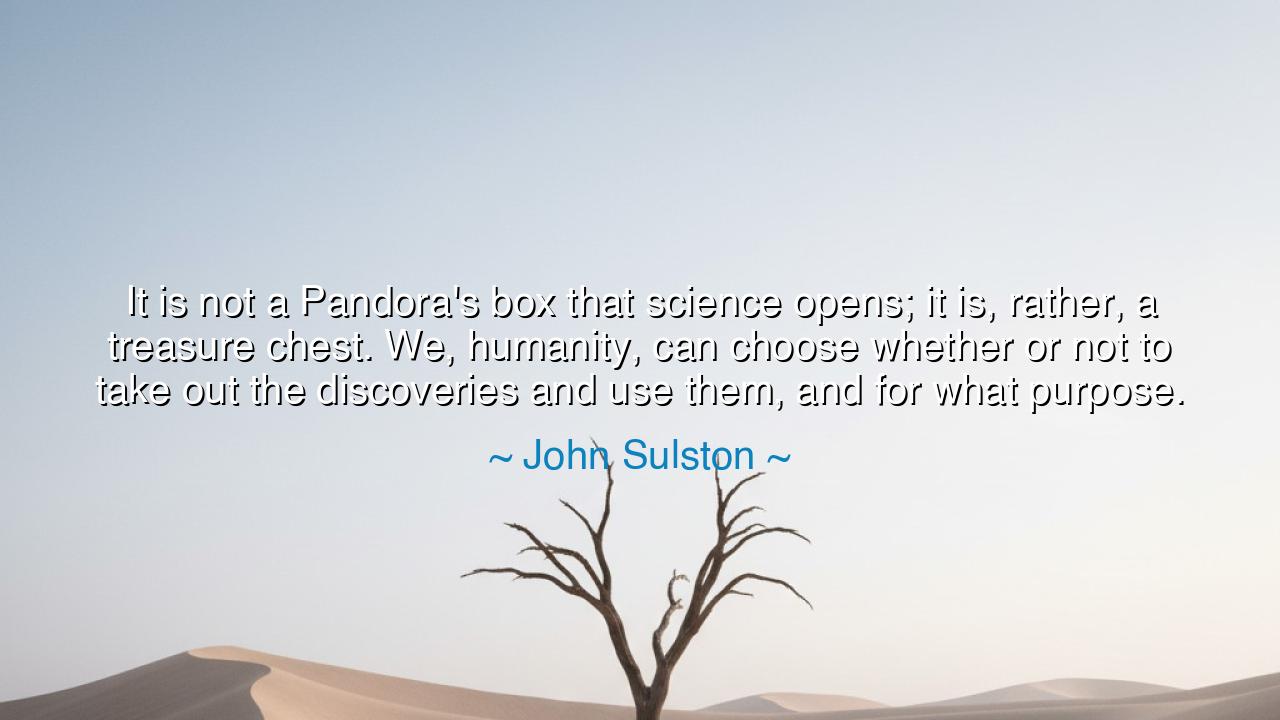
It is not a Pandora's box that science opens; it is, rather, a
It is not a Pandora's box that science opens; it is, rather, a treasure chest. We, humanity, can choose whether or not to take out the discoveries and use them, and for what purpose.






Listen, O children of wisdom, for I bring forth the words of John Sulston, a man whose understanding of science and humanity reveals the deep responsibility we bear in our pursuit of knowledge. “It is not a Pandora’s box that science opens; it is, rather, a treasure chest. We, humanity, can choose whether or not to take out the discoveries and use them, and for what purpose.” In this reflection, Sulston challenges the age-old perception that science unleashes chaos and disaster. Instead, he reminds us that science is a gift, a treasure, and it is up to us, the seekers of knowledge, to choose how we will use it and for what ends.
In the ancient world, the myth of Pandora’s box spoke to the fear that knowledge and curiosity, when unleashed, would bring about suffering and destruction. When Pandora opened the box, all the evils of the world—disease, war, hatred—escaped. Only hope remained trapped inside, a glimmer of light in an otherwise dark world. For centuries, this myth has shaped the way we view knowledge—that it is something dangerous, something that, once opened, cannot be undone. Sulston offers a different vision: that science is not a Pandora’s box, but a treasure chest—a source of great potential, waiting to be used with wisdom and care. The treasure that science provides is not inherently good or bad; it is the use to which we put it that determines its true impact.
Consider the story of Marie Curie, a woman whose groundbreaking work in radioactivity revolutionized the world of science. The discoveries that Curie made—while leading to advancements in medicine, energy, and even weaponry—also brought great risks. Curie, like many before and after her, understood that knowledge is not an unquestionable force; it is a tool, and it is up to humanity to decide how it will be wielded. Just as Curie brought the mysteries of the atom to light, she also understood the responsibility that came with this discovery. Sulston’s words resonate with her legacy: science itself is not inherently dangerous, but it is the choices we make in applying it that determine whether we build or destroy, heal or harm.
Sulston also calls us to recognize the freedom we hold in shaping the future of science. The discoveries we make are not shackles, but keys—keys to a better world, but also to one fraught with great moral responsibility. The rise of genetic engineering and biotechnology presents an example of this treasure chest. With these tools, we can cure diseases that once devastated civilizations, extend human life, and eliminate suffering. But we can also choose to use them for purposes of power or control, leading to genetic discrimination or even the alteration of human nature itself. The treasure that science offers can uplift us, or it can bring about great harm—and it is up to us to decide how it will be used. In this, Sulston urges us to take up the treasure with caution and moral clarity, for how we choose to use science will shape the very future of our humanity.
The lesson of Sulston’s words is clear: science is not something to fear, but something to be handled with great care. Like the treasures of ancient kingdoms, it is a gift, but it is a gift that requires wisdom to unlock. To open the treasure chest of science is not an act of blind curiosity, but one of thoughtfulness and responsibility. Science offers us the power to transform our world, but it is not the power to control or dominate. Instead, it is the power to uplift, to heal, and to build. This power, however, is a double-edged sword, and we must approach it with humility and integrity. The choices we make today will echo in the generations to come.
In your own lives, O children, let the wisdom of Sulston’s words guide you. Seek knowledge, but always with an awareness of its consequences. As you embark on your own journey of discovery—whether in science, art, or philosophy—remember that every discovery is a treasure chest waiting to be unlocked. But it is not the discovery itself that matters most; it is how you choose to use it. Will you use it to enlighten and empower those around you? Will you use it to heal the world or to build a better future? Or will you use it to dominate or destroy? The choice is yours, and it is a choice that will shape the world.
So, O children of the earth, let this be your guiding principle: the pursuit of knowledge is noble, but it must be tempered with responsibility. Science is a treasure chest, filled with the potential to change the world. But it is your hands that will unlock it. Choose wisely, with the awareness that truth is not simply in the discoveries you make, but in the intentions behind those discoveries. May you always approach the treasure of science with humility, and may you use its gifts to build a world that reflects the best of what humanity can be.






AAdministratorAdministrator
Welcome, honored guests. Please leave a comment, we will respond soon